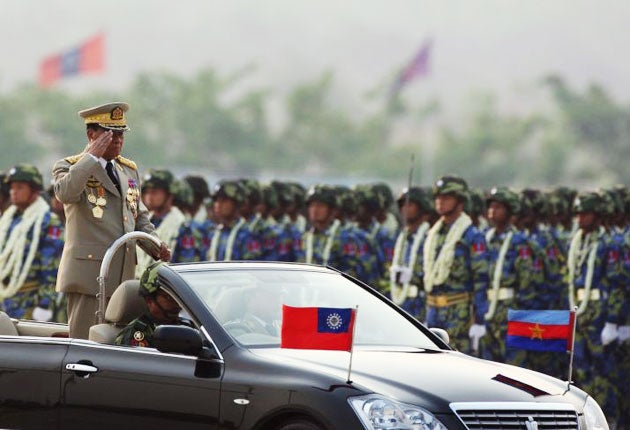Myanmar junta chief warns against 'divisive acts'

The leader of Myanmar's military junta today warned against foreign meddling in upcoming elections and said "divisive acts" could spark anarchy and derail the transition to democracy.
Addressing 13,000 troops at the country's annual Armed Forces Day parade, Senior General Than Shwe said Myanmar should oversee its own elections and urged patience and fair play.
"During the transition to an unfamiliar system, countries with greater experience usually interfere and take advantage for their own interests," the reclusive junta supremo, wearing full military garb and adorned in medals, said in a speech.
"For this reason, it is an absolute necessity to avoid relying on external powers," he said in the address, which was broadcast to the nation and witnessed by foreign journalists who received a rare invitation to the isolated nation.
Than Shwe did not reveal a date for the long-awaited polls, the first in two decades in the former Burma, a strategically situated but isolated country with rich natural resources from natural gas to timber and gems and a Southeast Asian port.
The election has beem widely dismissed as a sham to entrench nearly five decades of iron-fisted army rule.
The United States and United Nations have expressed frustration about the lack of inclusiveness of the polls, which they say will be far from credible, suggesting the removal of much-criticised Western sanctions will be unlikely.
Much of that centres on Myanmar's refusal to release 2,100 political prisoners, including long-detained opposition leader and Nobel Peace Prize winner, Aung San Suu Kyi.
Observers at the parade noted that 77-year-old Than Shwe, who is believed to be in poor health and rarely appears in public, walked and spoke more slowly than at the same event last year.
Analysts said the parade was more to remind the public that the military would remain the dominant political force long into the future.
The lavish parade is expected to be the last attended by Than Shwe and his top generals as the country's rulers. However, few doubt the junta strongman and his loyal army proteges will relinquish power when a civilian-led government is formed.
Than Shwe saluted the troops while he was driven in a convertible limousine in the newly built capital Naypyitaw before delivering a long speech in front of a backdrop of lush green mountains and statues of three ancient kings.
He said the election was just the start of a long process of democratic reform and urged discipline and patience by the country's 48 million people.
Than Shwe said political parties should avoid slander and dirty tricks to advance their own agendas.
"The improper practice of democracy often leads to anarchic phenomena," he said.
"Improper or inappropriate campaigning has to be avoided," he said, warning parties against "engaging in divisive acts that lead to disunity".
Analysts say the elections will create a parliament with only limited powers. The constitution stipulates that the armed forces commander-in-chief will remain the country's most powerful figure, more senior than the president and able to intervene "at times of crisis".
The military will retain control of key ministries and has a quota of 25 percent of parliamentary seats. Many more are expected to be taken by junta proxies, rendering elected opponents powerless in a tightly managed democratic system.
However, it is highly likely the arrangement will be accepted by its neighbours and regional allies, especially China, which relies on resource-rich Myanmar for its huge energy needs.
If the generals come good on their pledge to hand power to the people and Myanmar becomes a thriving market economy, it will not be any time soon, analysts said.
"The military and and its allies will remain in charge, with only an element of civilian rule," said Burmese academic Aung Naing Oo. "If Myanmar does become truly democratic, it will be a very slow transition."
Join our commenting forum
Join thought-provoking conversations, follow other Independent readers and see their replies
Comments
Bookmark popover
Removed from bookmarks